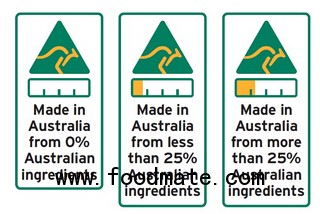 Australian Prime Minister Tony Abbott has announced a mandatory country-of-origin labelling system for food, to come into effect from next year.
Australian Prime Minister Tony Abbott has announced a mandatory country-of-origin labelling system for food, to come into effect from next year.The move is said to have been prompted by the hepatitis outbreak earlier in the year, attributed to contaminated Chinese berries.
As per the rules, food labels will provide information on the proportion of products made, grown or packaged in Australia, as well as a bar chart with domestic and international ingredients useage. Domestically produced products will have a green and gold kangaroo logo.
The new labels for locally processed foods will include statements such as "Made in Australia from 100% Australian ingredients", "Packed in Australia, Made in Canada" and "Made in Australia from Australian carrots and French peas."
While making the announcement, Abbott said: "This is a simple and straightforward initiative.
"Consumers will know what they are buying is Australian.
"The new labelling system was arrived at after the government put out a survey for community consultations that received over 18,000 responses."
"This is something the Australian public have wanted for a long time."
Agriculture minister Barnaby Joyce said: "In the past, it was always a case of frustration where you would pick up a can and it would say something like 'made in Australia.' The overwhelming sentiment of that statement was that obviously this product is Australian. Then, on greater investigation, it became apparent it was anything but Australian.
"It might have been put into a can in Australia but that is as far as it went. What this does is it gives you a clear understanding.
Though Abbott hopes companies would be encouraged to identify the origin of key ingredients with the new rule, it is expected to cost businesses $37m a year. Consumers could also need to shell out 1c more for every $5 they spend.
The new labelling system was arrived at after the government put out a survey for community consultations that received over 18,000 responses.
Country-of-origin labelling was proposed in February this year, drawing comments from some analysts over potential contravention of World Trade Organization (WTO) rules, reports the Guardian. Recently, WTO ruled against similar labelling in the beef sector in the US on grounds of favouritism.
However, Abbott has brushed aside these concerns, saying the US case is different and that the new regulations would satisfy WTO rules.
The move seemed to be prompted by the hepatitis A outbreak in February, which caused illness in several people after consuming frozen berries grown and packed in a Chinese factory with poor hygiene and tainted water conditions.
But there seems to be a continued confusion as the new rules are not very clear on 'international ingredients'. Companies are not required to disclose the sourcing of non-Australian ingredients, unless it is offered voluntarily.
As reported in 9News.com.au, the 'made from local and imported ingredients' tag will be removed.
The labelling will become mandatory from 2016, with a transition period for small business, though the voluntary take-up process means labels could be on shelves as early as this year.







